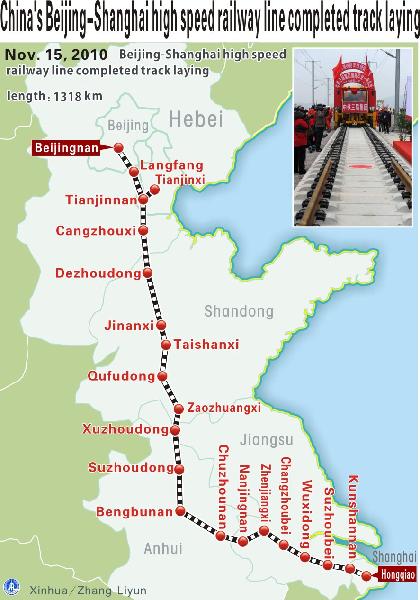Beijing-Shanghai high-speed railway in track
 |
|
Graphic shows China's Beijing-Shanghai high speed railway line completed track laying on Nov. 15, 2010. [Xinhua/Zhang Liyun] |
The Shanghai-Hangzhou line stunned the world with one train's record speed of 416.6 kilometers per hour while on a trial run.
China aims to make its high speed rail network the world's longest to boost economic growth.
According to the Ministry of Commerce, China will have a rail network of 110,000 km by 2012, with 13,000 km of it high-speed rail.
He Huawu, chief engineer of the Ministry of Railways, said high speed railway transportation would boost China's economic restructuring with its fast speed, large carrying capacities, convenience, and environmentally friendly nature.
Zhen Feng, a professor at Nanjing University, said the advancement of transportation always results in economic development, improved division of labor, and a more balanced development between regions.
Still, the rapid expansion of the nation's railway network has met with some opposition.
According to a report from the China Academy of Science (CAS), one of the country's top think tanks, the loans that have supported the rapid expansion of rail may not be sustainable.
Besides, the acceleration in infrastructure investment after the launch of the stimulus package has caused disconnections between transport services across the country, leaving highways, subways, train stations and airports not properly connected, it said.
The report, submitted to the State Council, China's cabinet, urged authorities to reconsider whether the government should make such massive investments in infrastructure, especially in high-speed rail.
Chinese authorities announced a 4 trillion yuan economic stimulus package in November 2008 to combat the global financial crisis. A large part of the package was for infrastructure construction.
 0
0 






